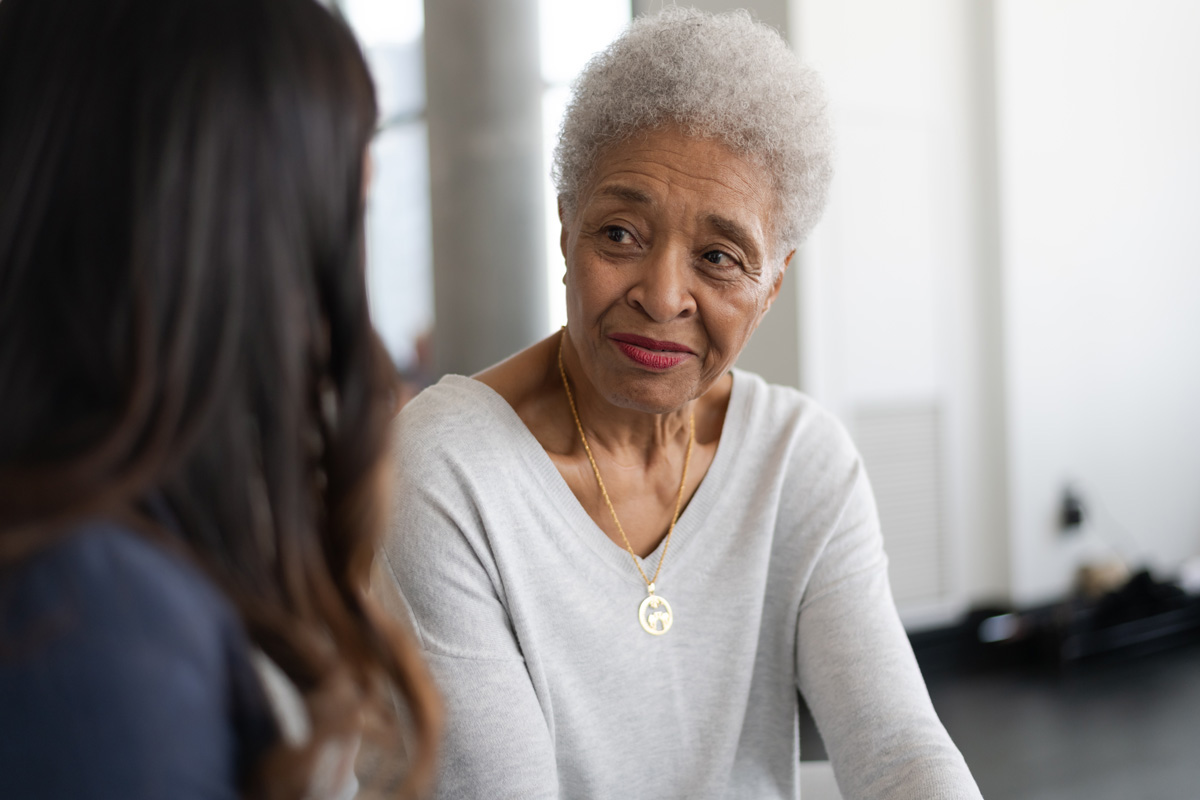- Patients
- Patient resources
- Questions to ask your consultant

Questions to ask your breast consultant
When you meet with your consultant you will be given a lot of information. You may forget to ask questions and may not remember everything you’re told. Making a note of your questions will help ensure you get the answers you need to relieve any worries or concerns.
What to ask
These are some common questions which you may find useful to ask your consultant.
It’s also important to make a note of any questions which occur to you as you go through your treatment so you can discuss them with your consultant and care team.
Questions about your breast cancer diagnosis
There are many different types of breast cancer, for example ductal, lobular, inflammatory. Breast cancer can also be invasive or non-invasive.
The stage and grade of the cancer will determine what treatments you and your consultant feel are best for you.
Hormone sensitive (also known as ER positive) cancers benefit from hormone (endocrine) treatments.
HER2 positive cancers may require anti-HER2 drug treatments and chemotherapy.
Many breast cancers are invasive and can spread to lymph nodes or other areas of the body. Lymph node involvement doesn’t mean that the cancer will spread elsewhere. However, you may need more tests or different treatment options if this is the case.
You may require further scans to establish how advanced your cancer is, for example CT, MRI or PET-CT scans.
It’s helpful to keep the contact details of your breast care nurse to hand so you can easily get in touch if you are worried or have questions.
Questions about your breast cancer treatment
If you need surgery your surgeon will explain what your operation involves, the potential side effects and risk of complications and give you guidance on how quickly you will recover.
Determining the most appropriate treatment options depends on the type of breast cancer you have, its stage and location. Your consultant will explain the treatment options to you, including the benefits and risks, and will work with you to decide on the most appropriate treatment plan.
When recommending your treatment options, your consultant will explain the reasons for doing so and share information about reasonable alternatives, including the option to have no additional treatment.
There are a number of different treatment options depending on the type of cancer you have. Your consultant will talk you through the outcomes which can be achieved by having the various treatments.
You will be given sufficient information to help you make the right choice and should not feel rushed into making an immediate decision. Some time to think things through may help you decide how you wish to proceed.
This depends on the treatment you are having and your consultant will explain this to you in detail.
You're welcome to bring a friend or family member with you to your appointments.
If you're having radiotherapy treatment, they won't be able to join you in the treatment room but they can wait in our waiting rooms.
If you're having a systemic anti-cancer therapy (SACT) such as chemotherapy, they can join you in your treatment room and there will be refreshments available.
- How many treatment sessions will I have?
- How long will each treatment session last?
- How often will I have a treatment session?
- How will treatment affect my everyday life?
- How soon will my treatment begin?
- Where will I have my treatment?
- Will I need to have a mastectomy or are there other options?
Questions to ask before your treatment
You may need more tests if you are having chemotherapy before surgery to help assess whether the cancer is responding to treatment.
Radiotherapy side effects are either short term (also known as ‘early’, occurring during or shortly after the treatment) or long term (also known as ‘late’, occurring months or years after treatment).
If you are having chemotherapy or anti-cancer drug treatments you will be given a 24 hour emergency contact number.
Healthy eating is important during treatment. You can get advice about nutrition and eating well during your treatment from your consultant, your breast care nurse or through our charity partner Penny Brohn UK’s wellbeing services.
Actually, exercise has been proven to aid recovery. People who exercise during treatment, particularly chemotherapy, tolerate treatment better. You may not feel well enough to exercise vigorously. Our Exercise Medicine team is available to advise you.
The best advice is to follow a healthy lifestyle with good nutrition and to exercise as much as you feel able to.
Some people continue to work during treatment, others feel too tired to do so. You may want to talk to your employer. They might allow you to work shorter hours until you have recovered from any side effects you experience. Macmillan Cancer Support can give you advice.
Questions after breast cancer treatment has ended
In the first instance, contact your breast care nurse. If they can’t help, they will get in touch with your GP or consultant.
It’s important to look out for symptoms which are:
- New or unusual for you
- Don't have an obvious cause
- Don't go away
If you experience any symptoms, contact your consultant or breast care nurse who will ensure you have the support you need without delay.
Your doctor may be able to advise local support groups in your area for you to get in touch with. You can also find a list of helpful organisations here.
- When is my next appointment?
- Will I need tests and scans at my follow-up appointments?
Contact us today if you have any questions or want to know more about how GenesisCare can help you. Call us on 0808 304 2332 or complete the form below